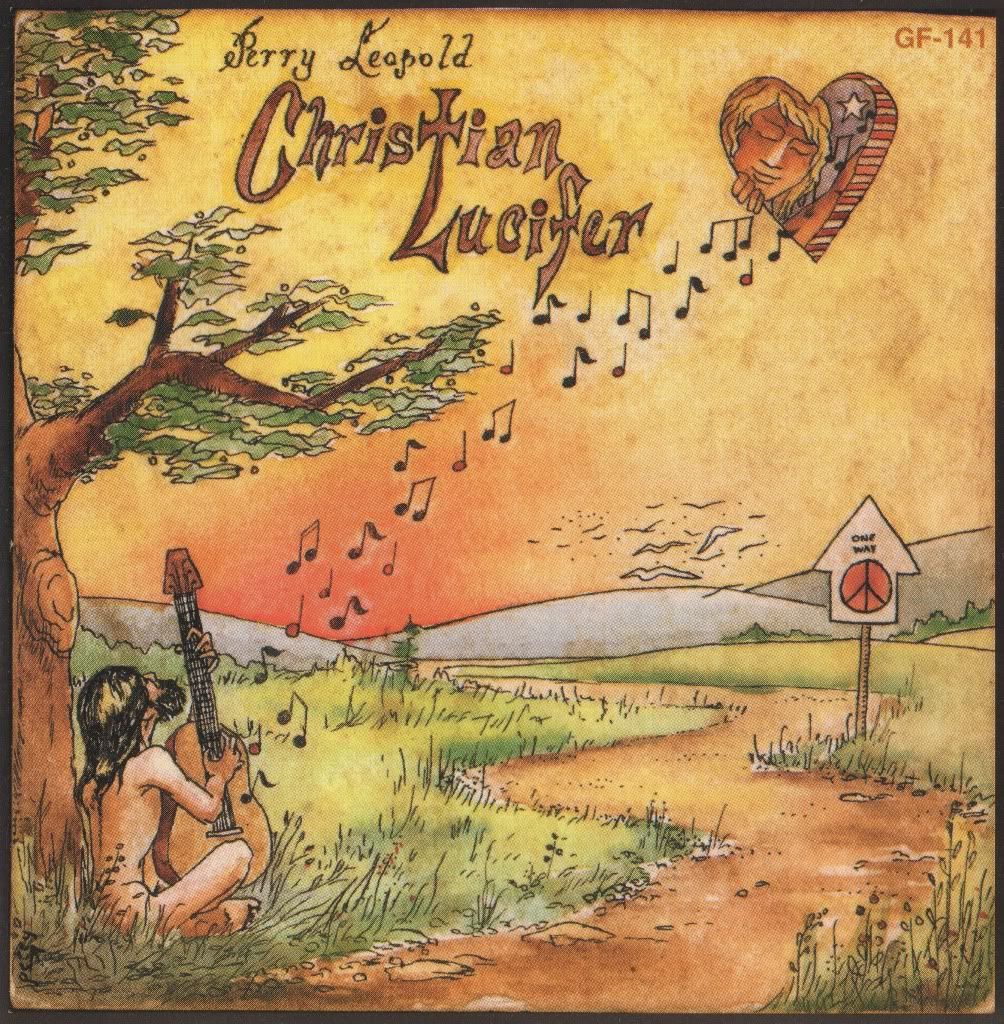Monday, October 10, 2011
Perry Leopold - Christian Lucifer
The acid folk genre is a lonely and under-appreciated one in terms of mainstream recognition, especially when it comes to American artists. Since there's never really been a commercial market for it, those of us who enjoy experimental, genre-bending singer/songwriter music often have to spend some time digging and take chances on obscure albums like this in order to locate some hidden gems. Leopold's second (of two) album's, 1973's Christian Lucifer is a well-realized attempt at one of progressive folk's more popular facets--fusing acoustic singer/songwriter material with lush orchestral arrangements and classical composition techniques.
As the title more than suggests, Christian Lucifer is spiritually-focused. Thankfully, though, it's not that kind of explicit worship theme that verges on dreaded "Christian rock" and threatens to derail even the delightful period kitsch of artists like Judee Sill. Rather, Leopold manages to provide depth to his personal spiritual conflict by using accessible imagery and evocative language that holds up well without attention to the subtle Christian underpinnings. Throughout the set, Leopold frets over questions of love, despair, overcoming of adversity, and redemption, rarely invoking typical Christian lyrical tropes with the notable (and effective) exception of the valedictory "Lord I love you" refrain of "Vespers," the album's closing track.
Probably what this album has going for it most is a cohesive atmosphere. Leopold's lyrical subjects are for the most part somber and reflective, moods that are exceedingly well-represented by the album's arrangements and songwriting. Most of the songs are based on 12- or 6-string acoustic guitar parts, often strummed and occasionally fingerpicked. Surrounding and layered on top of those guitar parts, though, are orchestral arrangements filled with both wind instruments and strings, electric keyboards, lead guitar, some subtle hand percussion, and an airplane hangar's worth of reverb, which is used a little for psychedelic ends in "Serpentine Lane," but more often for general atmosphere.
Interestingly, I find the album's arrangements and production simultaneously subtly detailed and impenetrably dense. While there are many moments where delicate wind lines (often oboe) rise above the other instruments or a keyboard riff sounds out audibly for a few seconds, equally as often there's so much instrumentation that it all blends into a homogeneous river of sound. Though it's tempting to start using the music critic-favored "over-produced" criticism, it's actually one of my pet peeves, in part because it's most often used as a broad-brush dismissal and very rarely do critics develop the reasons why they think something is over-produced. In my mind, the first question is "Would these songs succeed with only a guitar [in this case] and vocals?" and the second is "Does each added instrument or production element add something distinctive and justify itself on an ideological basis?" If the answer to the first question is "no," then you've got music that either attempts to compensate for a lack of substance with production or simply needs all of the instruments and production to be properly conveyed--there's nothing wrong with that and, if true, it almost invariably means that the answer to the second question is "yes." If the answer to the second question is a "no," then I think we're getting into the territory of unnecessary production and perhaps again into reasonable claims that the production is an attempt to mask songwriting inadequacies.
In the case of Christian Lucifer, I think the songs' core arrangements could certainly stand alone, but when it comes to the orchestral part-writing, things are often a little muddy and parts do come across as unnecessary because they're in another instrument's register, doubling numerous other instruments rhythmically, or there's simply so much sound happening that things are lost. Now, the "dense sound" school of thought has advantages when it comes to tonal color and the creation of a thick-yet-subtle sound monolith, but to achieve the proper balance is to toe a very thin line. My criticism of this album's orchestrations is similar to the beef I have with a lot of arrangements I hear in new music--the heavy blanket of sound seems to be there because "it seemed like a good idea" and because strings etc. seem to add drama and class just by dint of being included. Rather than imbuing each part with an individual sense of purpose and pursuing the potential for melodic enhancement, development, or counterpoint, the orchestrations float like a vague, noodly cloud above and around the guitar/vocal core, never really managing to achieve the sort of integration into the actual structure of the song that seems to me to be the ultimate ideal of including such lush instrumentation.
What the production sacrifices in space and well-developed intent it gains partially back with a sense of gravitas and cohesiveness in mood. It helps that Leopold wrote a few really good melodies for his songs and includes some memorable hooks, partially obscured as they may be at times. "The Starewell" includes a surprising minor/major change with an almost Cat Stevens-like verse sound, also including some of the most rhythmic/energetic dynamism of the album, while "The Anunciation" boasts a great vocal arrangement that effectively juxtaposes double-tracked recordings of Leopold's thick baritone (which somehow reminds me a little of Tom Rush's). While I generally prefer either a bit more instrumental verve (Pete Fine's On a Day of Crystalline Thought, in spite of its hippie-dippyness) or just a bit more sophistication in arrangement and integration of orchestration (Tudor Lodge), Christian Lucifer is always a pleasant and relaxing listen with a lot to discover with repeated spins--it's neither the most psychedelic lost acid folk gem nor the most instrumentally engaging, but it's popularity with other aficionados attests to the passion and authenticity of Leopold's personal expression.
Tune in next time for a contrasting example of singer/songwriter orchestral integration that I think is really well-done.
Subscribe to:
Post Comments (Atom)


1 comment:
Great review! Saludos from Spain!
Post a Comment